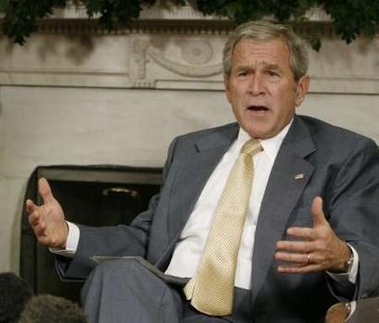Bush defends US interrogation methods
Updated: 2007-10-06 09:37
WASHINGTON -- President Bush defended his administration's methods of detaining and questioning terrorism suspects on Friday, saying both are successful and lawful.
 US President George W. Bush makes remarks on the economy in the Oval Office of the White House in Washington, Oct 5, 2007. [Agencies] |
"When we find somebody who may have information regarding a potential attack on America, you bet we're going to detain them, and you bet we're going to question them," he said during a hastily called Oval Office appearance. "The American people expect us to find out information, actionable intelligence so we can help protect them. That's our job."
Bush volunteered his thoughts on a report on two secret 2005 memos that authorized extreme interrogation tactics against terror suspects. "This government does not torture people," the president said.
Meanwhile, Senate Armed Services Committee Chairman Carl Levin, D-Mich., demanded a copy of a third Justice Department memo justifying military interrogations of terror suspects held outside the United States.
In a letter to Attorney General-nominee Michael Mukasey, Levin wrote that two years ago he requested -- and was denied -- the March 14, 2003, legal opinion. Levin asked if Mukasey would agree to release the opinion if the Senate confirms him as attorney general, and cited what he described as a history of the Justice Department stonewalling Congress.
"Such failures and the repeated refusal of DoJ to provide Congress with such documents has prevented the Congress from fulfilling its constitutional responsibilities to conduct oversight," Levin wrote.
The White House said Mukasey has not been cleared to read the classified documents Levin requested.
The two Justice Department legal opinions from 2005 were disclosed in Thursday's editions of The New York Times, which reported that the first opinion authorized the use of painful methods, such as head slaps, freezing temperatures and simulated drownings known as waterboarding, in combination.
That secret opinion came months after a December 2004 opinion in which the Justice Department publicly declared torture "abhorrent" and the administration seemed to back away from claiming authority for such practices, and after the withdrawal of a 2002 classified Justice opinion that had allowed certain aggressive interrogation practices so long as they stopped short of producing pain equivalent to experiencing organ failure or death.
The second Justice opinion was issued later in 2005, just as Congress was working on an anti-torture bill. The opinion declared that none of the CIA's interrogation practices would violate provisions in the legislation banning "cruel, inhuman and degrading" treatment of detainees, The Times said, citing interviews with unnamed current and former officials.
Though both memos remain in effect, the White House insisted they represented no change from the 2004 policy.
|
|
|
||
|
||
|
|
|
|

